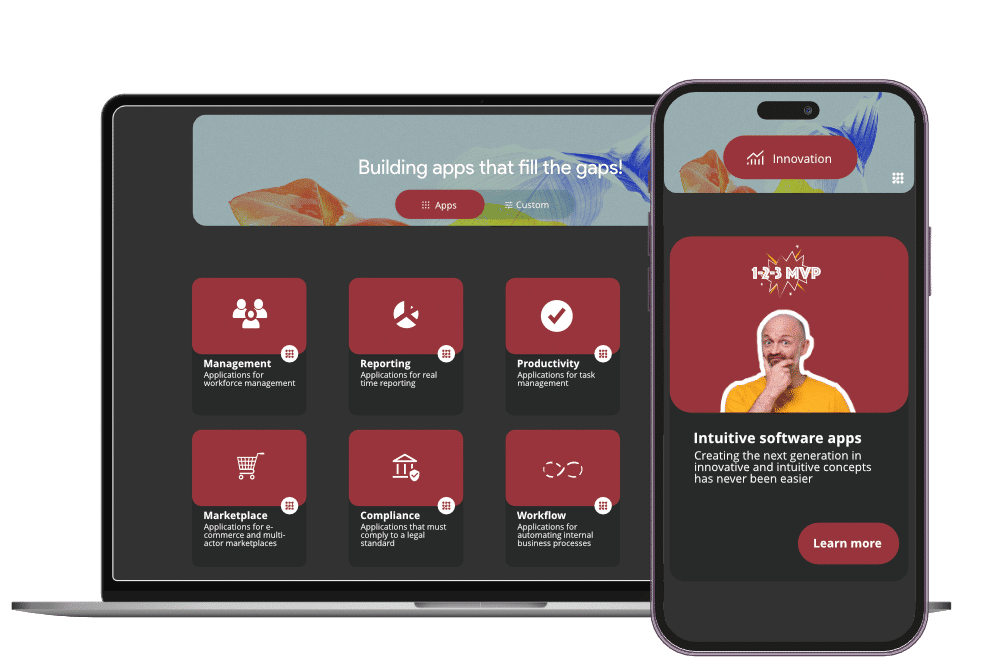Custom mobile application development
For enterprises looking to manufacture custom built mobile based applications, abac leverages it’s extensive knowledge and predictable processes for mobile application development.
Custom software development for mobile applications
Industry runs on software. With abac, industry leaders can manufacture web applications to spec, on time, with agility in mind by following an elaborate and predictable process






Process
As industries run on concrete processes that are optimised by software, abac ensures it’s own processes used for the manufacturing of software solutions are as transparent and intuitive as possible.
Conceptual knowledge share
A series of meetings will ensure that the context for developing the mobile application is properly understood by abac
Strategy assessment
An assessment is made with regards to the context of the development work, and abac provides enterprises with a clear collaboration strategy and delivery estimation.
Development start
Based on the predefined strategy, the development process is started by abac which will incrementally build, test, ship and demo functionality to the stakeholders.
Feedback
As a manufacturer of software solutions, it is our full intent that the resulteing systems help enterprises optimise operations and grow incrementally. As such, abac shares in both an enterprise’s problems and it’s solutions, with great interest.
Custom software development for mobile applications
Bring your digital product to life and take it to market with a company that will own up to your mission.

Frequently asked questions
How are mobile applications created?
Similar to building a house, mobile applications destined for iOS or Android must follow an elaborate process before they can reach market grade maturity. For manufacturing mobile applications, we follow a finite set of steps that guarantees the yielding of intuitive apps. And that process is fully transparent.
Native mobile apps vs hybrid mobile apps?
Native mobile applications are applications developed using a vendor’s specific tehnologies for each particular operating system.
For example, native iOS apps are mobile applications that are developed using Apple’s Objective-C or Swift technologies and are destined to run on top of the iOS operating system.
Similarly, mobile application development for Android is performed using the Kotlin or Java programming languages that yield applications destined to run on top of the Android operating system.
The advantage of in building native applications is that you can make use of platform dependent features with less development effort.
The downside is that each application must be written using the mentioned vendor specific technologies. To put things simple, you write two distinct pieces of code for yielding two distincts mobile applications for iOS and Android.
On the other hand, hybrid mobile applications are applications that are implemented using a technology that can cover multiple platforms. To put things simple, you write one piece of code that will run on both Android and iOS. As an example of hybrid development technology, we have Google’s Flutter or Facebook’s React Native.
When is it better to develop a mobile application instead of a web applications?
In our day to day, we make use of both mobile applications and web applications in order to satisfy our needs.
Basically, mobile applications will always be faster than web applications and this is because of the underlaying technology that renders the content on the screen.
The main 5 reasons for using mobile applications in favor of web applications are:
- The need for building an application that offers functionality, without it being able to access the internet.
- The need for mobile native functionalities that are practically dependent of a mobile operating system (email, bluetooth, push notifications, AR to name a few).
- The need to allow the users of the app to have random access to the application for frequent use, whilst preserving performance (ex. Evernote, Facebook, Spotify etc.).
- The need for performance in situations where the application must perform complex graphical processing whilst offering a fluid operability.
- The need for using ASO (App Store Optimisation) as a preffered marketing channel for gaining traction with the application on a market.
How much does it take to develop an MVP for a mobile application?
Usually, the complexity involved in developing a mobile application depends on the number of functionalities or screens that the mobile application must offer to its end users.
If we were to put T-Shirt sizes in order to denote complexity, from our experience, we can say that:
- S –> Mobile application development that requires between 1-3 months for yielding the first version of the application
- M–> Mobile application development that requires between 3-6 months for yielding the first version of the application
- L –> Mobile application development that requires between 6-12 months for yielding the first version of the application
- XL –> Mobile application development that requires more than 12 months for yielding the first version of the application
How is mobile application development estimated?
The way in which mobile application development effort is estimated varies from company to company.
At abac, we make use of an estimation process that is backed by real world experience, thus ensuring that our estimations are realistic for developing applications against a fixed budget.
How much does a simple MVP app cost?
Mobile applications vary quite a lot depending on industry of use and purpose. În general, an MVP version of an app will cost you around 10.000$ – 15.000$.




